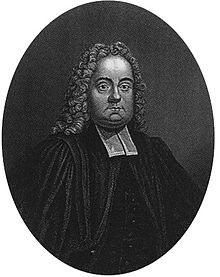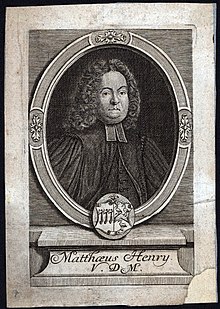Matthew Henry
Appearance

Matthew Henry (October 18, 1662 – June 22, 1714) was an Welsh non-conformist clergyman. He became minister of a Presbyterian congregation at Chester in 1687, removing in 1712 to Mare Street, Hackney. Two years later, he died suddenly of apoplexy at Nantwich while on a journey from Chester to London.
Henry's well-known Exposition of the Old and New Testaments (1708–1710) is a commentary of a practical and devotional rather than of a critical kind, covering the whole of the Old Testament, and the Gospels and Acts in the New Testament. Its simple piety and its practical application, combined with the well-sustained flow of its racy English style, made it one of the best works of its type.
Quotes
[edit]- Were a man to live as long as Methuselah, and to spend all his days in the highest delights sin can offer, one hour of the anguish and tribulation that must follow, would far outweigh them.
- A commentary upon the holy Bible: Job to Salomon's song (1835), p. 418.
- Wise anger is like fire from a flint: there is great ado to get it out; and when it does come, it is out again immediately.
- Reported in The Miscellaneous Works of the Rev. Matthew Henry (1830), p. 134.
Commentaries
[edit]
- The woman was made of a rib out of the side of Adam; not made out of his head to rule over him, nor out of his feet to be trampled upon by him, but out of his side to be equal with him, under his arm to be protected, and near his heart to be beloved.
- Genesis 2:21.
- Many a dangerous temptation comes to us in fine gay colours that are but skin-deep.
- Genesis 3.
- The better day, the worse deed.
- Genesis 3.
- So great was the extremity of his pain and anguish that he did not only sigh but roar.
- Job 3.
- To their own second thoughts.
- Job 6.
- He rolls it under his tongue as a sweet morsel.
- Psalm 36.
- Our creature comforts
- Psalm 37.
- None is so deaf as those that will not hear.
- Psalm 58.
- They that die by famine die by inches.
- Psalm 59.
- To fish in troubled waters.
- Psalm 60.
- Here is bread, which strengthens man's heart, and therefore called the staff of life.
- Psalm 104.
- Hearkners, we say, seldom hear good of themselves.
- Ecclesiastes 7.
- Those who will not be counselled, cannot be helped. More souls are ruined by pride than by any other sin whatever.
- Isaiah 16:6-14
- It was a common saying among the Puritans, "Brown bread and the Gospel is good fare."
- Isaiah 30.
- Blushing is the colour of virtue.
- Jeremiah 3.
- It is common for those that are farthest from God, to boast themselves most of their being near to the Church.
- Jeremiah 7.
- Blushing is the colour of virtue.
- Jeremiah 20.
- None so blind as those that will not see.
- Jeremiah 20.
- Those may justly be reckoned void of understanding that do not bless and praise God; nor do men ever rightly use their reason till they begin to be religious, nor live as men till they live to the glory of God. As reason is the substratum or subject of religion (so that creatures which have no reason are not capable of religion), so religion is the crown and glory of reason, and we have our reason in vain, and shall one day wish we had never had it, if we do not glorify God with it.
- Daniel 4:34-37.
- Not lost, but gone before.
- Matthew 2.
- Those that are above business.
- Matthew 20.
- Better late than never.
- Matthew 21.
- Saying and doing are two things.
- Matthew 21.
- Judas had given them the slip.
- Matthew 22.
- Whatever we have, the property of it is God's; we have only the use of it, according to the direction of our great Lord, and for his honour.
- Luke 16.
- After a storm comes a calm.
- Acts 9.
- Men of polite learning and a liberal education.
- Acts 10.
- It is good news, worthy of all acceptation; and yet not too good to be true.
- Timothy 1.
- It is not fit the public trusts should be lodged in the hands of any, till they are first proved and found fit for the business they are to be entrusted with.
- Timothy 3.
- Judas had given them the slip.
- Luke 22.
- Do nothing till thou hast well considered the end of it.
- Proverbs 7.
Dictionary of Burning Words of Brilliant Writers (1895)
[edit]- Quotes reported in Josiah Hotchkiss Gilbert, Dictionary of Burning Words of Brilliant Writers (1895).
- Extraordinary afflictions are not always the punishment of extraordinary sins, but sometimes the trial of extraordinary graces.
- P. 9.
- The way to preserve the peace of the church is to preserve the purity of it.
- P. 148.
- An active faith can give thanks for a promise even though it be not yet performed, knowing that God's bonds are as good as ready money.
- P. 241.
- The sentences in the book of providence are sometimes long, and you must read a great way before you understand their meaning.
- P. 280.
- In all God's providences, it is good to compare His word and His works together; for we shall find a beautiful harmony between them, and that they mutually illustrate each other.
- P. 281.
Misquoted
[edit]- I thank Thee first because I was never robbed before; second, because although they took my purse they did not take my life; third, because although they took my all, it was not much; and fourth because it was I who was robbed, and not I who robbed.
- First reported in Arnold Gingrich, Coronet, Volume 17 (1944), which characterizes the quote as a diary entry. A much earlier report in "Life of the Rev. Matthew Henry", in Christian Biography (1799), p. 66, has Henry writing:
What reason have I to be thankful to God, that having travelled so much, yet I was never robbed before now. 2. What abundance of evil this love of money is the root of, that four men should venture their lives and souls for ubout half-a-crown a-piece. 3. See the power of Satan working in the children of disobedience. 4. The vanity of worldly wealth—how soon we may be stript of it, how loose we ought to sit to it.
- First reported in Arnold Gingrich, Coronet, Volume 17 (1944), which characterizes the quote as a diary entry. A much earlier report in "Life of the Rev. Matthew Henry", in Christian Biography (1799), p. 66, has Henry writing:


